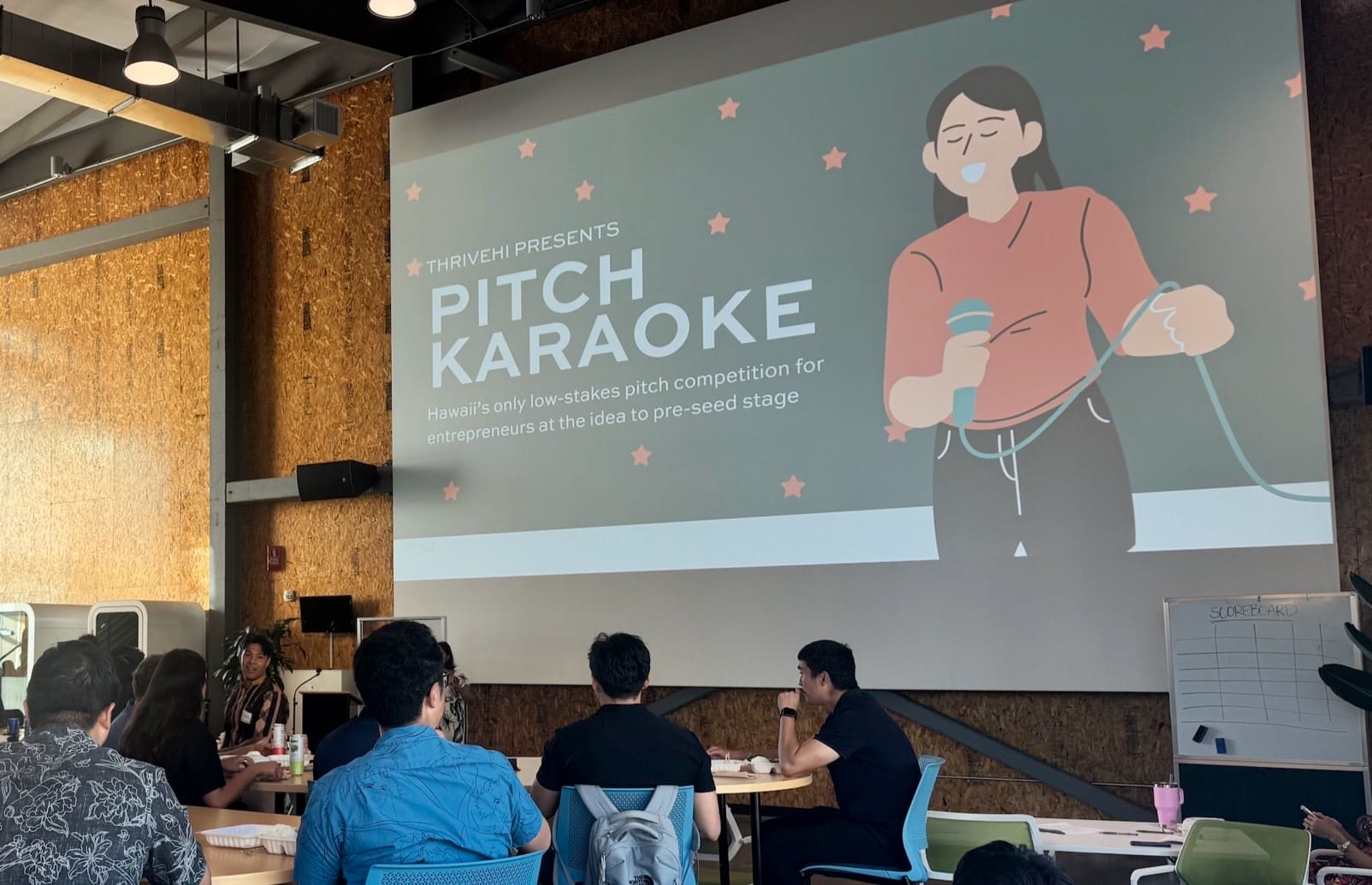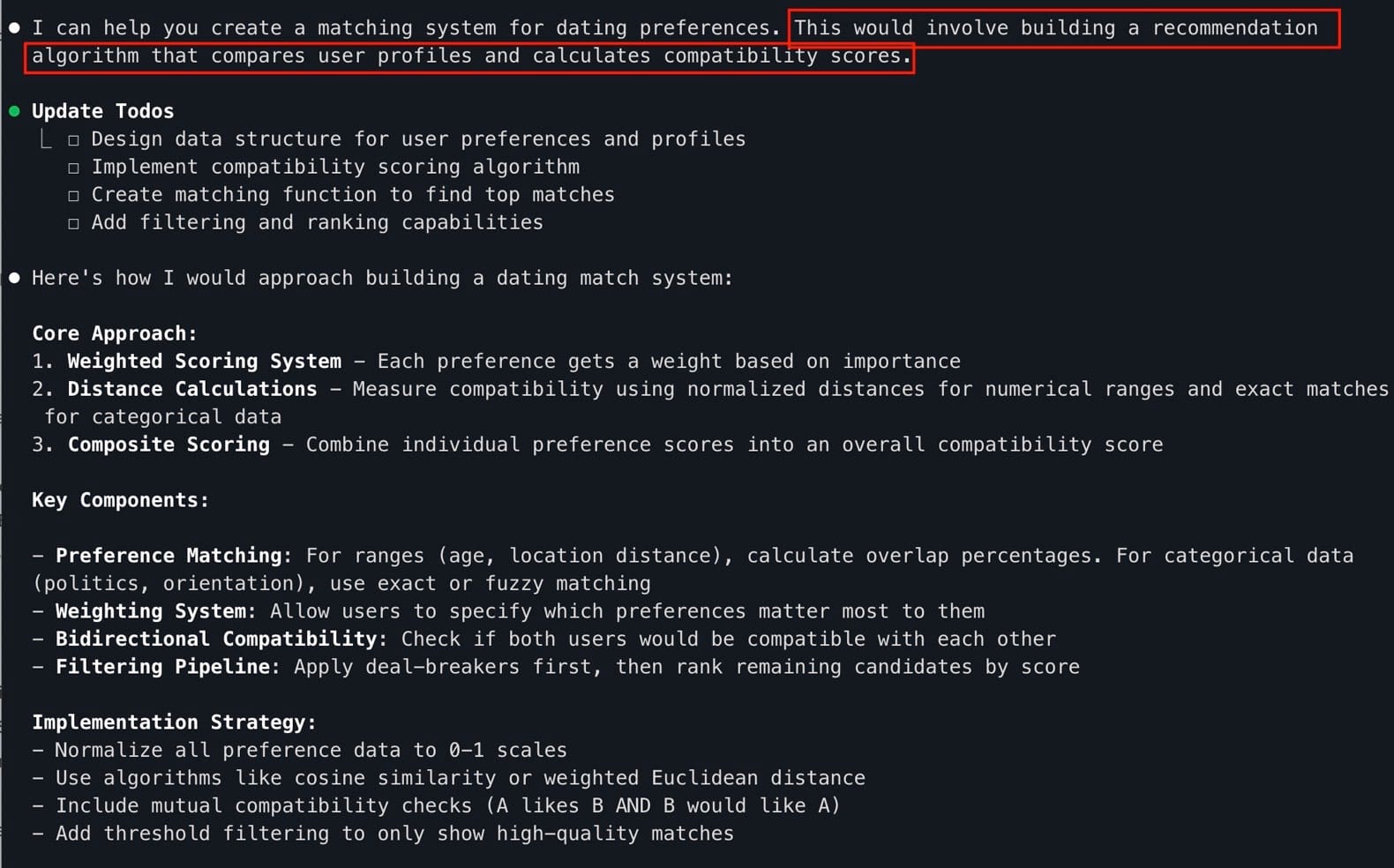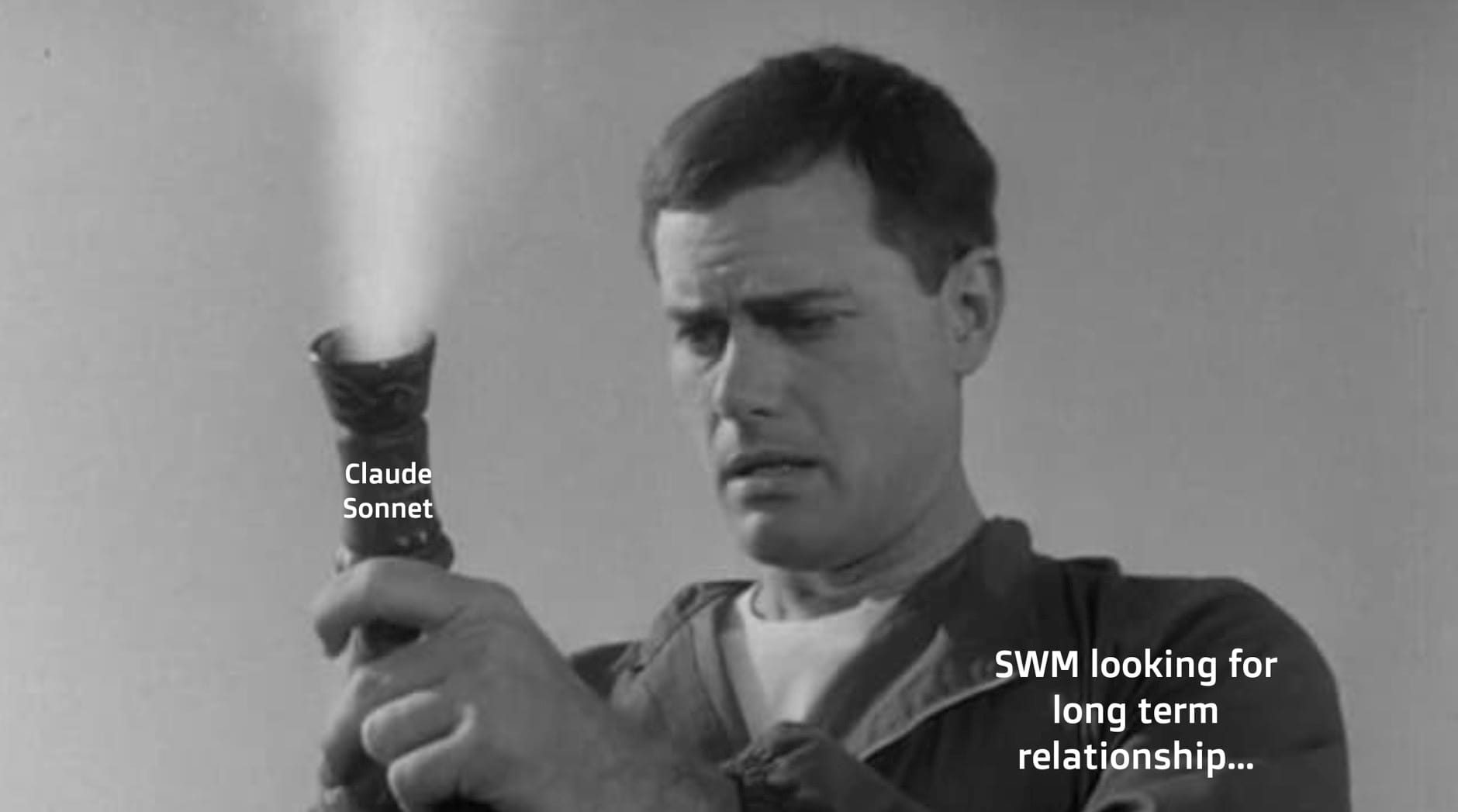There were a number of angel investors in the audience at this function and it was really neat (and inspiring) to see these entrepreneurs risk so much. Getting up on stage in front of a live audience, people in your field you don't know, and giving your pitch? That takes extreme courage!

Which is why I went. I really admire people who are willing to put it all out there, all in the hopes of refining their presentation and, perhaps, tweaking their business model.
Of course, given there were investors in the audience, every deck had some level of AI integration in there. Two of them stood out to me, however, in that they both based their value proposition on "using AI to match based on the interests of the customers".
Claude, Find Me a Date
The most notable one was a dating application. Before I dig in to this, I want to say the main reason these companies were at this pitch night was to get feedback and refine their model and decks. I'm not trying to pile on, yet I also think there's something to be learned here.
So this dating application is differentiating itself because, like the other company, it was going to "use AI to match people across a wide variety of preferences". This made me scratch my head.
AI isn't magical, and variants of matching algorithms are well known. I won't say it's a "solved problem", but it's kind of a solved problem. If you ask an LLM, let's say it's Claude Sonnet 4, to match people based on dating preferences, this is the response you're going to get back (I actually did ask using Claude Code, and it was a fun experiment).
Here's my prompt:
I have a large set of personal user data, which contains dating preferences of all kinds. Let's assume, for now, it's 10 preferences with range data involving subjects like education, politics, orientation, spontanaity, relationship length, location, and age (among others). Can you sift through this data and, using the preferences, create matches? If do, how would you do it?And here's the answer:

This makes sense as far as answers go. LLMs are trained on things that exist and are very good at giving you code to run in the form of a script, or code you can add to your application. They are not, necessarily, genies in a bottle waiting to come out and solve your dating problems.
Either way, I pressed on:
I don't want an algorithm, I want *you* to do it. Give me information on how you would actually do this. Add a time complexity analysis.The answer is basically "OK, I'll crawl your dataset for you, implementing the algorithm I was about to suggest":

This is a very reasonable approach. It's also completely unnecessary for the LLM to do this for us. In fact it's a very bad idea.
Here's why:

If you've ever had to create a matching algorithm, you know that a brute force way of doing it, which is something a machine might suggest, is going to be O(n^2), the worst time complexity you can have.
There are heuristics and approximations, of course, and this is where we get into graphing algorithms and NP-Complete problems, which are both fun and extremely difficult to deal with in terms of 1) getting them right and 2) getting them to scale.
The point here is simple: AI is not going to win the Millennium Prize proving that P = NP. It's only capable of telling us what we already know.
So why are these businesses expecting something more?
You Just Move the Slider
You might be wondering: so, Rob, did you share your thoughts with the founders then? The answer is: sort of.
It's been my experience that challenging someone's business model is a delicate business, and unless you're very persistent, you'll get ignored immediately. People will dub you a "hater" or simply think you don't understand their pitch. This is their dream, after all, and no one likes their dream shattered.
So I did the next best thing: I asked the angel investor sitting next to me. His company provided an angel round to the other startup using AI as its IP (a real estate rental landlord/tenant matching platform):
I'm curious how you would position this company for valuation since their IP is a flip of the coin in terms of an AI response. You really can't expect the same answer twice, and can only hope that you've provided clear constraints. That seems like a tough thing to evaluate.
The answer was fascinating: "It's not a flip of a coin. You just move the slider a bit to refine the answer". I'm not entirely sure, but I think the "slider" being mentioned here is the limitation on "guessing". No need to press this point, I translated this as "we're going to use laser-focused instructions to cut down on the variability".
By "variability" I mean telling it how you want the weighting and matching to be done, which would likely be something like the screenshot above using scoring and overlaps.
In other words: algorithms that already exist. This was my next question:
Matching algorithms are a known thing and not something you need AI for. In fact, that would be extremely expensive if you were to use AI to chunk through your customer base in a machine learning way. I can see using AI to suggest a first chat message between matched people maybe, or suggest locations for first dates that are public and provide a sense of safety...
That's when I saw the look: you don't seem to understand AI. It's capable of a lot of wonderful things.
Being Positive
There's obviously a massive land grab happening in our industry, and it's not just the startup space. Big companies are looking to improve performance and efficiency, and mid-size companies are trying to do more with less staff.
And yes, many of them are trying to create AI-centric apps that do magical things. I think this is due to the wildly embellished promises that AI tools present. Then again, maybe I'm wrong. One thing I've learned over the last two years of using this stuff daily: it will surprise you.
Either way, to me, these tools are great at enhancing your current idea. Matching landlords to renters is a fine idea, but perhaps AI could be used to fill in the documents or create the lease forms for you. You could have it help you create better ad copy for your property, and, if you're a renter, have it help you fill out your renter profile.
This is what MagicDoor does, and it's impressive stuff (I don't think the real estate founder knew about MagicDoor last night).
I think it's up to the people who are cutting through the marketing hype, the ones actually doing the work with AI, to provide their insights and experience. I didn't want to rain on anyone's parade, but I do plan on emailing the matchmaking founder and offering a few ideas for them to both fill their vision and use AI "stuff" to enhance their offer. I'm also going to offer my help, for free of course.
I'm also going to listen. I might have missed something entirely.
What do you think? Have you heard any wild pitches or ideas? If you're logged in, share your comments!
